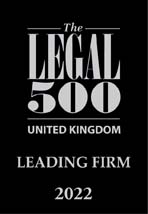
Legal 500, 2021
The team is very flexible, responsive at any time of the day with clear-cut answers. Very helpful and understanding of client needs.

News
One minute briefing: the Supreme Court gives the final word on the law of arbitration agreement
November 12 2020
Enka v Chubb [2020] UKSC 38
As a follow up to our previous briefing in May on the decision of the Court of Appeal in this important and much-discussed case, after a two-day virtual hearing, the Supreme Court confirmed the Court of Appeal’s decision (albeit for different reasons) and granted an anti-suit injunction in restraint of proceedings brought in Russia in breach of a clause that submitted disputes to ICC arbitration, “seated” in London.
By way background: the Turkish construction company Enka was contracted to perform certain works in the construction of a power plant in Berezovskaya, in Siberia, Russia. After the power plant had been completed and was operational, there was a fire. The owners of the power plant claimed under their insurance policy with Chubb, for about USD400 million. Chubb then brought a subrogated claim against Enka (and others) in tort, in the Russian court, claiming that they were (jointly and severally) responsible for the fire.
Enka sought an anti-suit injunction against Chubb to enforce the ICC/London arbitration clause in its contract. Chubb said (amongst other things) that, because its claim was in tort, it was not bound by the arbitration clause in the contract between its insured and Enka.
At first instance, the English Judge refused Enka the anti-suit injunction, saying (amongst other things) that the Russian court was the correct one to decide whether the arbitration clause applied or not. He also criticised Enka for delay in making the application for an anti-suit injunction (which Enka said was while it tried to forestall what it considered to be an unmeritorious threatened claim through the commercial route).
The Court of Appeal reversed the first-instance Judge’s decision, robustly rejecting his view that it was for the Russian court to decide whether it had jurisdiction (a forum conveniens approach), summarised the principles for identifying the law of an arbitration agreement where it has not been expressly chosen by the parties, and disagreed with the Judge that there had been undue delay on the part of Enka. The Court of Appeal Judges also rejected the first instance Judge’s view that choice of London as the seat of arbitration under the rules of an international arbitral body such as the ICC was simply one of convenience: they found that the courts of the seat have an important role to play in supporting arbitration “seated” within their jurisdiction.
By the time the matter reached the Supreme Court, there was one main issue: in the absence of an express choice of law for the arbitration agreement, what law applies?
Both the Court of Appeal and the Supreme Court came to the same conclusion, that the law applicable to the arbitration agreement was English law, but for different reasons. The Court of Appeal held that, in the absence of express choice, the arbitration agreement is governed by the law of the seat as a matter of implied choice, while the majority of the judges in the Supreme Court held that the default position is that arbitration agreement is governed by the law with which it is most closely connected, which will generally be the law of the seat chosen by the parties.
It should also be noted that, during the period between the first instance decision and consideration by the English Court of Appeal, the Russian proceedings continued on the merits, despite Enka’s continued objection to the Russian court’s jurisdiction. This resulted in the Russian court rejecting Chubb’s claim against Enka. As result of the Supreme Court’s findings, Chubb withdraw its claim (and appeal) against Enka in the Russian proceedings.
During the continuing COVID-19 crisis and BREXIT, this judgment re-affirms the English Courts’ commitment to supporting party autonomy when they have chosen to resolve their disputes through arbitration seated in the UK, and granting anti-suit injunctions where appropriate. It also demonstrates the reactiveness of the English courts to the needs of the parties: because the proceedings commenced in Russia by Chubb were moving ahead and so the English courts’ findings were time-critical, the first-instance trial and the appeals to the Court of Appeal and the Supreme Court were all heard in just over seven months.
This case was unusual in that the parties to the agreement had not chosen the law to govern the contract as a whole (and that law would likely have governed the arbitration agreement if they had done so) but, as has been commented in other writings following the Supreme Court’s decision, the practical tip to take from the case in order to avoid such disputes is to pay close attention to governing law clauses when drafting contracts.
Kevin Cooper of MFB Solicitors was part of the team advising Enka in relation to its successful appeal to the Court of Appeal and the defence of Chubb’s appeal to the Supreme Court.
https://www.bailii.org/uk/cases/UKSC/2020/38.html
Download PDF (57.94 kB)
-

Brochure
Download our online brochure




